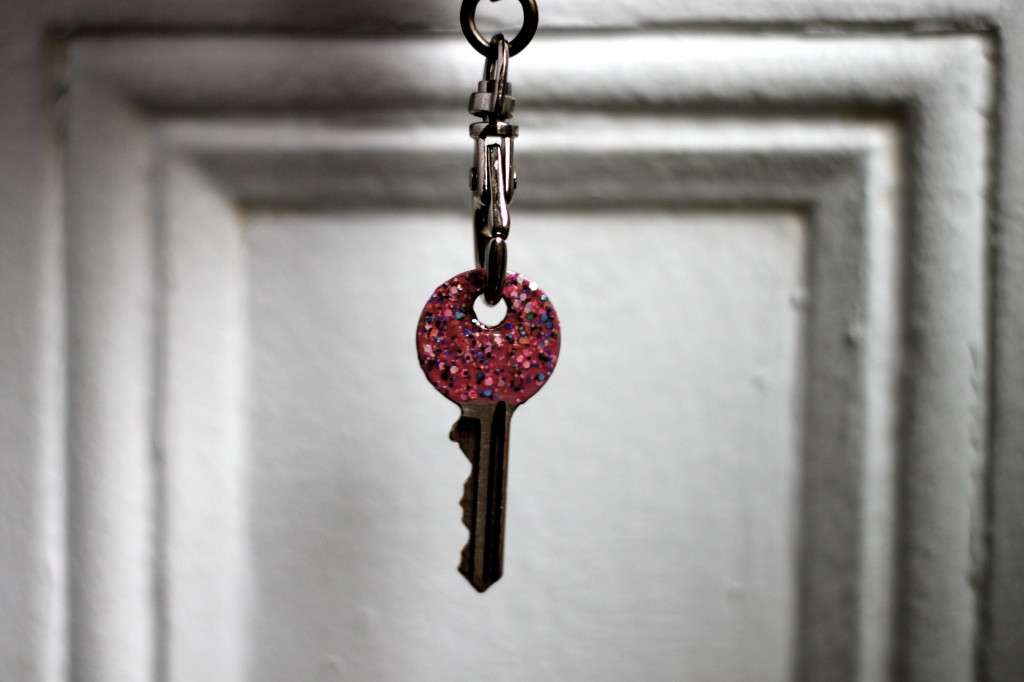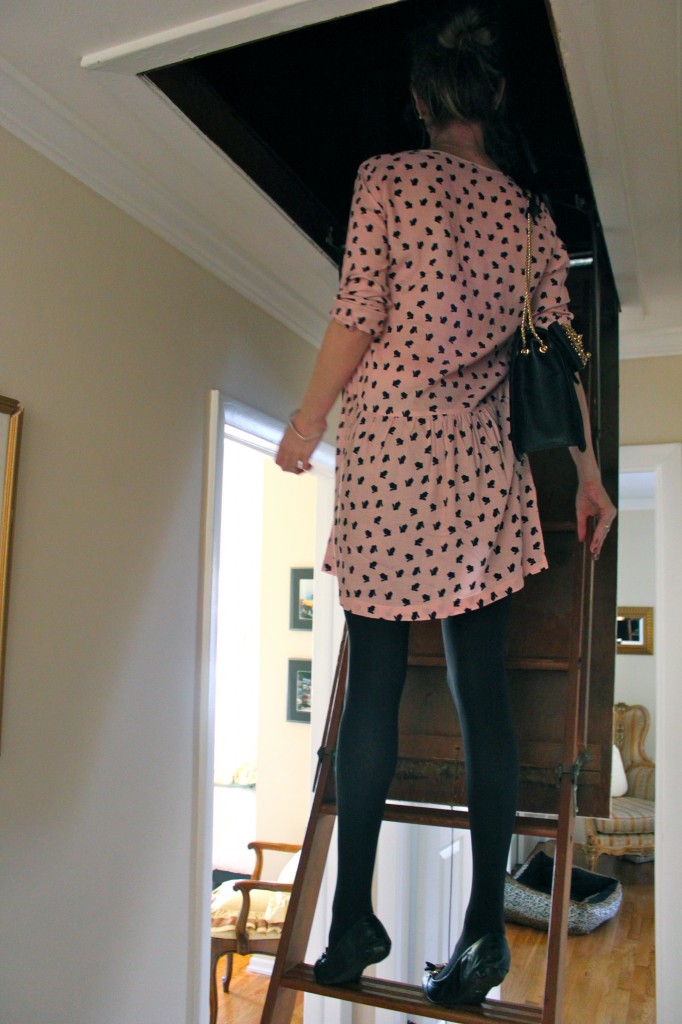
The other day we had a couple of friends over for dinner who are renting in the area and circling the idea of purchasing property, and at one point they looked around them and said, “But seriously: how do you do it? If you want to buy a house, where do you even start?”
I can totally relate to that feeling. Before we began our two-year odyssey I felt like buying a house was such a huge undertaking, so riddled with technicalities and legal issues and words like appraisals and inspections and FHA loans that sounded like a completely foreign language, that I simply wasn’t the kind of person who was capable of doing it. It seemed like the kind of thing “other people do.” People who know, for example, what a variance is.
Guess what? I know what a variance is now.
But in the beginning, I didn’t even know what Step Number One was. Did you call…a bank? A broker? Check your credit score?
I was starting from zero.
Over the course of the two years that it took us to go from thinking about moving to closing, I learned many, many things…but most of all, I learned that it’s possible. It really is. You just need to do your research, take it one step at a time, and remember that buying a home – despite all those dry-sounding words – is a hugely emotional process. I can promise you that a few things will probably go wrong along the way, and that you will probably have a meltdown or two, but I can also promise you this:
They say that in the end things always work out for the best, and in my experience…they do.
I wrote this primer almost exactly a year ago – just days before we closed – and I thought I’d put it up again for those of you who might be considering taking the leap yourself.
How to buy your very first home, after the jump.
A caveat, before I begin. I am not an expert at any of this stuff; nor am I a licensed attorney, broker, finance-type person, or anything of the sort. So if I get anything major wrong (or if you’d just like to add your own experiences), please go ahead and comment below.
I am, however, someone who started from scratch and spent two years deep in the process, and had what both my broker and bank loan officer referred to separately as the hardest time they’ve ever seen anyone have buying a house. (Really.)
When I started out I knew literally not one single thing about how one goes about buying their first home, and now I know…kind of a lot, actually. And I think it’s a valuable thing to hear about how it works from someone who, for better or for worse, is just a normal person trying to figure out how to do this so-called “normal” thing.
So: here’s how it went down for us, and what we learned along the way.
1. SAVING UP
First, let’s talk savings, because planning for such a large purchase is key.
A couple of years ago, we decided that we wanted to start trying for a baby and set a goal of moving out of the city and purchasing a home sometime during the year following the baby’s birth. To do this, of course, we’d need to save up for a down payment, closing costs, and random assorted home-buying expenses, and also make sure that we were able to accommodate the cost-of-living increases that come along with home ownership (for example, homeowners insurance and home repairs). Excel spreadsheets became our very best friend.
Our savings strategy was simple, and worked for us:
1) We set up an automatic weekly transfer from our checking account to our savings account (a smallish number, but one we knew we would be comfortable with).
2) Since my income fluctuates from month to month while Kendrick’s stays the same, we figured out the amount we needed me to contribute in order for us to cover our expenses, and then put anything I made above that amount into our savings account. Did we do this perfectly? Nope; we definitely pulled funds out of savings from time to time, when we had large or unexpected expenses. But overall, this worked really well, and resulted in us being able to save up what we needed over the course of about a year and a half.
2. GETTING A LOAN
After setting up a savings strategy, the next step is to figure out what you can afford. Get thee to a bank, and chat with a loan officer.
Figuring out “what you can afford” actually means two things:
1. What can you actually afford to pay every month?
The rule, when buying a home, is to look for a property priced at 2.5x your gross income, but this rule didn’t really work for us because I’m self-employed, and my income fluctuates. What we did: took the average of my monthly income over the course of a year, reduced it by 1/3 so that we were being conservative, and then added that number to Kendrick’s monthly income to arrive at a safe estimate of what we could afford.
Remember, though: Houses cost more than just your principal and interest (a mortgage calculator can help you figure out what your monthly payments will be based on the purchase price). Home ownership expenses include, but are not limited to, the following:
– Up-front costs (down payment, closing costs, etc)
– Moving costs
– Insurance
– Furnishings
– Home improvements (a fixer-upper may sound romantic, but there may be a significant outlay of cash in the first few months – more on this below)
2. What does the bank think that you can afford?
For most people, the bank loan will be a (relatively) accurate indicator of what they can “actually” afford. Not so for us: banks put enormous hurdles in place for self-employed people in search of a loan, which I suppose makes sense considering the uncertainties involved in self-employment.
What it came down to was that we were only eligible for a much smaller loan than what we could actually afford based on a conservative estimate of our combined average monthly income. How we handled this: we asked Kendrick’s parents to co-sign on our loan, which they were kind enough to do (it creates liability for them in the event that we default on payments), and we made sure to only look at homes that we could “actually” afford, not that the bank now “thought” that we could afford.
In short: even if the bank declares you eligible for a certain dollar amount, try to confine your search to properties that you feel certain that you’ll be comfortable making the payments on.
If you’re a first-time buyer, you may be eligible for an FHA loan: this is good (because you only have to make a down payment of 3.5% as opposed to, say, 10%), and also in some ways not good (some buyers may be wary of selling to you because of all the additional things that the bank makes you do to secure your loan). (More on this below.)
3. TAXES AND TAXES AND TAXES
Taxes make a huge difference. What do I mean by this?
1. You will enjoy lots of lovely tax benefits as a home-owner.
In short, you can deduct mortgage interest payments (which comprise the bulk of your payments at the start of a 30-year loan) and property taxes from your income tax. See an accountant to help you figure out how to determine how these savings will affect your potential purchase price.
2. Property taxes make a huge difference when it comes to monthly payments.
When we first started looking at houses, I basically ignored fluctuations in property taxes and looked only at the listing price for the homes, figuring, you know, how big of a difference could they make? But I was very wrong to do this, because it’s just basic math: a house with $12,000 a year in property taxes is going to cost you $1,000 a month in taxes; a house with $6,000 a year in property taxes is going to cost you half that. Taxes make a huge difference.
We ended up with a home that was slightly pricier than what we had initially thought we could afford because the property taxes were so much lower on that property than they had been on lower-priced houses that it all came out in the wash.
3. Things are a little different if you’re getting an FHA loan.
If you’re FHA, you will be expected to pay the entire first years’ homeowner taxes prior to closing. This is just one of those “little” (by which I mean totally annoying and totally not little, but certainly littler than many other costs associated with home ownership) surprising costs that come up that no one ever told you about. Be prepared for this to happen every so often (hopefully less often after you’ve read this post).
4. FINDING A HOME
To start your home search, I’d advise hopping on the Internet: Trulia and Homes.com are both good, easy-to-navigate sites that can give you a general sense of what’s available in the areas you’re interested in.
Tips:
1. Look at homes both above and below your “ideal” range. Why? A) You never know, and B) You may find a home that seems too expensive but that has very low property taxes for one reason or another (which is what happened to us).
2. Your broker may not be able to talk about things like the local school system with you – there are laws that prevent them from doing this – so you’ll have to do your own research.
3. Even if a fixer-upper home seems like it needs too much work to be financially feasible, consider the fact that you may be able to negotiate a seller’s concession, wherein the seller basically gives you cash at the closing that you can use however you like.
5. BIDDING
This part sucks. You know how you’ve heard that it’s a “buyers market”? Apparently not for us, because we got involved in – and lost – three bidding wars in a row. And then a house that we lost came back on the market, we got in another bidding war over it, and we lost again. No fun.
Here’s what you need to know to have a less miserable experience than we did:
1. Get pre-approved for the amount you’re willing to pay in advance. Do not wait until you find a home you love to start the loan application process, because this might result in someone else sweeping it out from under your feet.
2. Try this strategy (which was what ultimately won us the home we’re trying to close on now): If you find yourself in a bidding war, tell your broker that you will bid X dollars (we said 5K) over the other bidders’ highest bids, up until a certain point. You must pick your top number, or you risk paying way more than even you think the home is worth. And if the war goes beyond there, c’est la vie.
3. Remember that even if you lose one place, your dream home is still out there. If it’s meant to be, it will be, and if not, this was not your home. People say that all the time, but it’s true. It really is. It happened to us, and to literally every single other person I know who has gone through this process.
6. CONTRACTS
Congratulations: you have an acceptable offer! This, however, is different from an accepted offer; it just means that the owner is good with the amount of money you’ve offered. There’s still quite a ways to go: ahead of you are inspections, contract negotiations, the official “accepted” offer, and a lot of paperwork. To give you a sense of how interminable this process can be: our “acceptable” offer happened, like, fifty years ago. I’m still waiting for a closing date.
Patience, grasshopper.
The single most important thing that you can do prior to starting the contract negotiations is to have an inspector come in to check out the property. Do this right away, and make sure that you (rather than the seller) hire the inspector, because this is where you’ll find out how much room you have to negotiate (if you have expensive repairs that need to be made, for example, the seller may be open to lowering the price, doing the repairs themselves, or providing you with a seller’s concession).
(Problems on House #2 discovered during inspection.)
Or you might pull out entirely, like we did after discovering an oil tank issue at a home we had an offer on earlier this year (not the one we’re in contract for now).
7. “SURPRISE” COSTS
You know that you’ll need money for a down payment, but there are a lot of costs (both big and little) that have come up and surprised me along the way. Here’s a rundown:
– Inspection: You’ll have to pay for this even if the sale ends up falling through in contract negotations. It’s a pain – we had to pay for inspections twice (once on a house that we let go, and a second time on the house that we’re trying to close on now), but it’s necessary.
– Lawyer’s fees: My mom is a lawyer, which makes me lucky. This can get expensive.
– Title report: Your lawyer will run a title search to make sure that there are no weird claims on the property that will create a problem at closing.
– Insurance: You’ll need homeowner’s insurance, and if you’re FHA you’ll have to pay for the entire first year up-front (depending on your bank’s policy).
– Closing costs: There are lots of different components that go into closing costs, so they vary pretty dramatically…but they’re always a pretty major expense.
8. CLOSING
The closing is essentially the hand-off, where all the lawyers and players get together, everyone is in a good mood because this crazy process is finally over, and the signing begins. (Or at least that’s how I envision it, because ours hasn’t happened yet.)
Post-closing, you own the house and can move in at any time. But there’s a lot of paperwork that you need to sift through in preparation for closing, and you will spend many, many hours on the phone with your lawyer, bank loan officer, broker, and possibly a contractor (discussing any repairs that the bank may require in advance of closing). Just be patient, have a good printer/scanner at the ready, and take it one thing at a time.
One thing to note for freelancers: since you’re probably not making consistent deposits, you’ll have to provide documentation to the bank explaining any “large deposits” – so make sure you keep excellent records tracking your income.
You should also make sure that both partners’ names are on all of your bank accounts – for some reason our savings account is only in my name, so I’ve had to sign (and have the bank sign) a “Gift Letter” documenting every transfer from our savings account into our joint checking account saying that I basically gave our marital union a “gift”. Why? No very good reason, other than procedure and to make me crazy.
Prior to closing, the bank will also do their own appraisal and inspection – they want to know that the house is “worth” the amount of money that you’re borrowing to pay for it, and they may require some fixes to be made in advance of closing. These are generally the seller’s responsibility to fix and pay for, but of course who does and pays for the repairs is open to negotiation.
9. WHEW
So that’s it! I know, it sounds like an interminable hassle, but the end result is beyond worth it. And it is doable, I promise.
I hope that was helpful – please let me know if you have any questions, and again, if you’d like to add anything from your own experiences, I’d love to hear from you in the comments.



